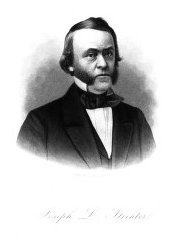
Joseph Lybrand Stichter, Merchant, was born in Reading, Pennsylvania, October 30th, 1813. He is a son of Peter Stichter and his second wife Elizabeth (Lybrand), and grandson of Conrad Stichter, who emigrated to America from Lubeck, Germany, in the year 1750, and settled in Reading. Peter Stichter was born in Reading, 1761, and educated in the schools of the neighborhood. When he was sixteen years of age he entered the Revolutionary army, becoming a private in Lieutenant Miller's Company of Berks County Militia. He subsequently served in a company attached to General Irwin's command at Flourtown? and was also with Washington at Valley Forge. He was a man of sterling integrity and great usefulness in his day, a Commissioner of the county, and a prominent and ??? member in the Lutheran Church, also of the Lutheran Synod of Pennsylvania. Joseph L. was educated in the German and English schools of the place, and when fifteen years old entered the iron store of Keim & Drenkle as an apprentice. He remained with them and Daniel M. Keim & Co. until 1837, when he formed a co-partnership with John M. Keim, under the style of Keim & Stichter. This house so continued until 1841, when the former disposed of his interest to James McKnight and the style was then changed to Stichter & McKnight. This association was dissolved in 1858, the senior partner purchasing the interest of the junior and becoming sole proprietor. In 1871, by the admission of his son, Thomas D., the firm became as it now stands, Joseph L. Stichter & Son. These several firms always occupied the same premises, which in former days were known as the residence and Indian rendezvous of Colonel Conrad Weiser, who was the interpreter duly commissioned by the Provincial Governor from 1731 to 1753. The house underwent from time to time various improvements and enlargements, until finally it was accidentally destroyed by fire January 16th, 1872. The site is now occupied by a remarkably fine structure, which is believed to be one of the most elegant in the interior of the State. The business now carried on is the same as in former years, embracing hardware, iron, steel, paints, drugs, tin plates, metals, etc. The house has always maintained a high position at home and abroad for solid credit and integrity. Originally a member of the Lutheran, Joseph L. Stichter joined the Episcopal Church in 1833, and has ever since continued an active member of the same, having served as Sunday-school teacher, vestryman and chorister of the congregation. He has also frequently represented the congregation in Annual Conventions of the Protestant Episcopal Church of the Diocese of Pennsylvania, and was present at the session last presided over by the venerable Bishop White. In 1869, he originated and carried into successful achievement a choral celebration of the Fourth of July, at which over ten thousand persons were present and in which six hundred singers participated. It was a memorable event in the history of the city. In works of charity and benevolence he has always taken an active part, especially in the establishment of the Reading Benevolent Society, of which he was the Treasurer for over a quarter of a century. He has also been identified with all the prosperous enterprises of the city, and assisted in establishing the telegraph line to Philadelphia; in building and maintaining the Reading Cotton Factory, of which he was also a Director for many years. He was also among the earliest friends and supporters of the Philadelphia & Reading Railroad, the Lebanon Valley Railroad, and the Eastern Pennsylvania Railroad, of which latter he is a Director. His house helped to maintain the credit of the Philadelphia & Reading Railroad in 1841-'42, when the company was entirely prostrated and their property was seized by the sheriff, by supplying material when no money could be obtained by them in Philadelphia. He has always encouraged all enterprises calculated to enhance the material prosperity of the city and county, and has ever been one of the most active and valuable members of the Agricultural and Horticultural Society of the county, and has served as its Vice-President. He has been a leading member of the Masonic Order since 1834, and has filled various important offices in that body, including that of District Deputy Grand Master. The present high character and prosperity of Masonry in Berks county owes much to his zeal, labor, fatherly counsels and care. He has received many flattering demonstrations in his retirement from Masonic service, including testimonials from various lodges; Lodge No. 254 at Pottstown is named Stichter Lodge. He was married, August 23d, 1845, to Elizabeth H., daughter of Thomas Diehl, a well-known Philadelphia merchant.

Source: The Biographical Encyclopedia of Pennsylvania of the Nineteenth Century. Philadelphia: Galaxy Publishing Co., 1874, pp. 274-275.
Contributed by: Nancy.